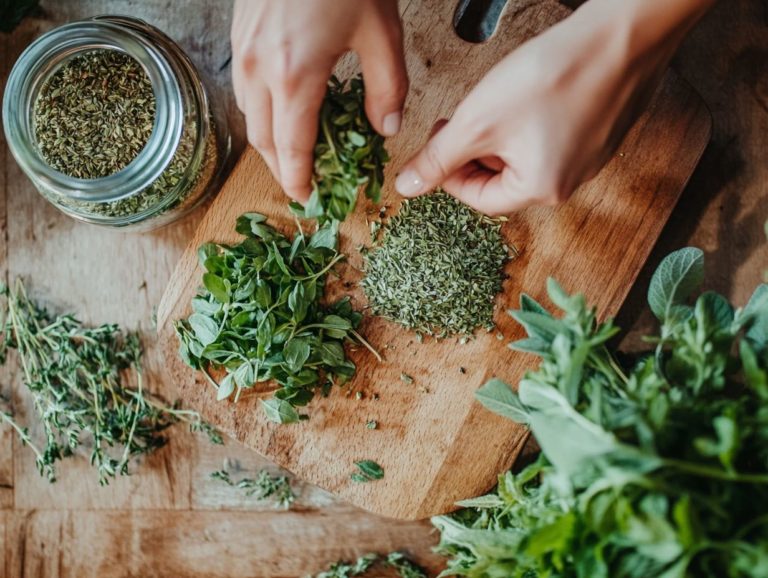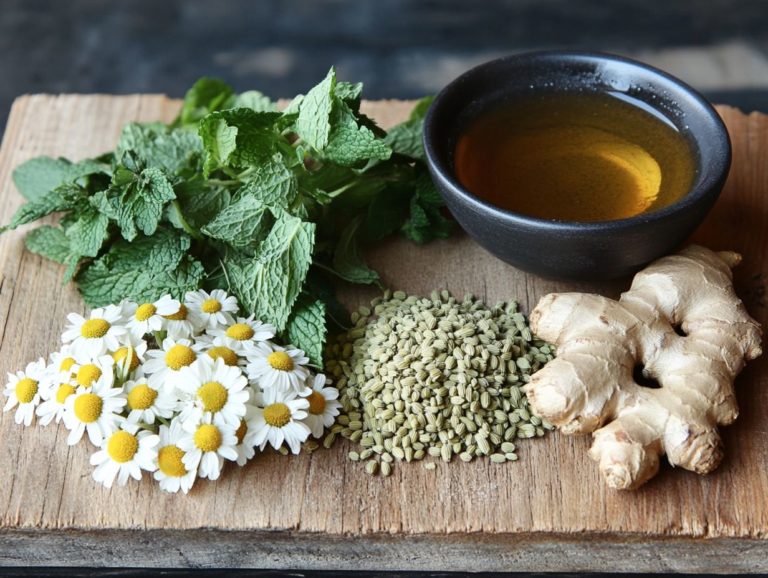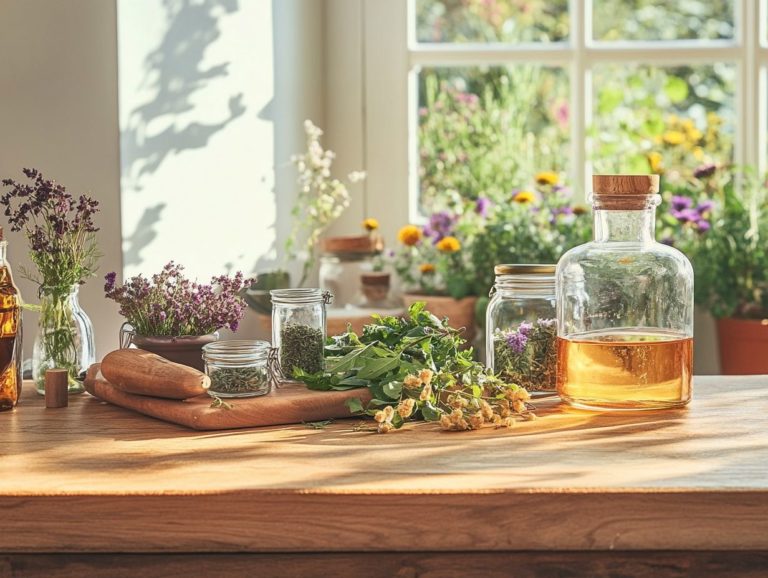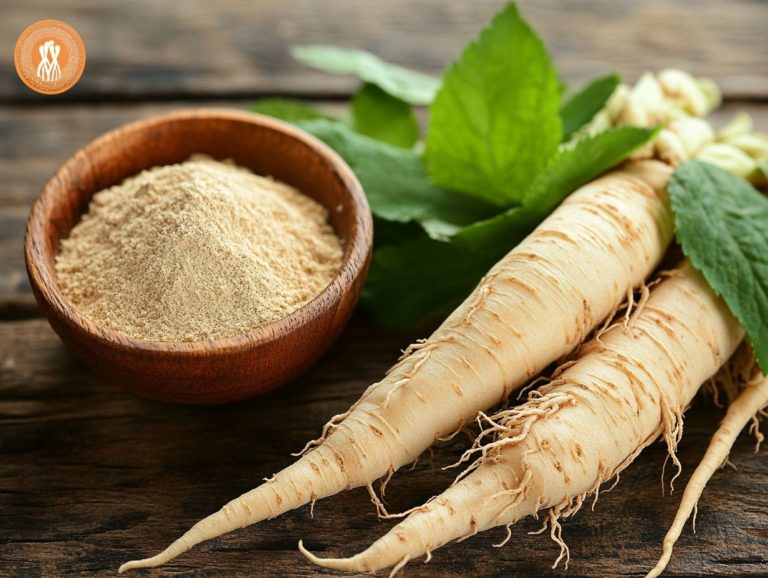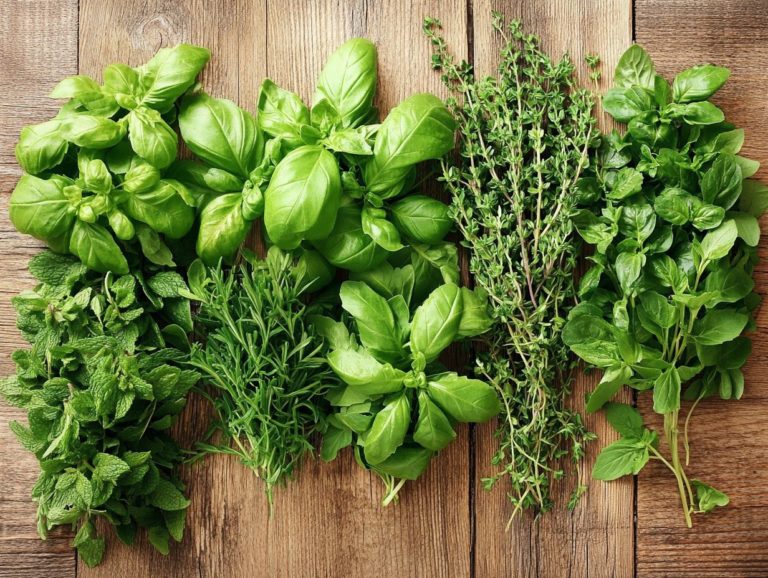5 Common Herbs Found in Every Kitchen
Herbs are not merely flavor enhancers; they are potent allies in your journey toward health and wellness.
In this piece, you’ll explore five common herbs that likely grace your kitchen: garlic, ginger, turmeric, cinnamon, and basil. Discover their versatile applications in everyday cooking, their numerous health benefits, and their potential medicinal properties.
You will also find valuable storage tips and learn about other popular herbs that might pique your interest. Jump in and see how these herbs can transform your cooking and boost your health!
Contents
Key Takeaways:
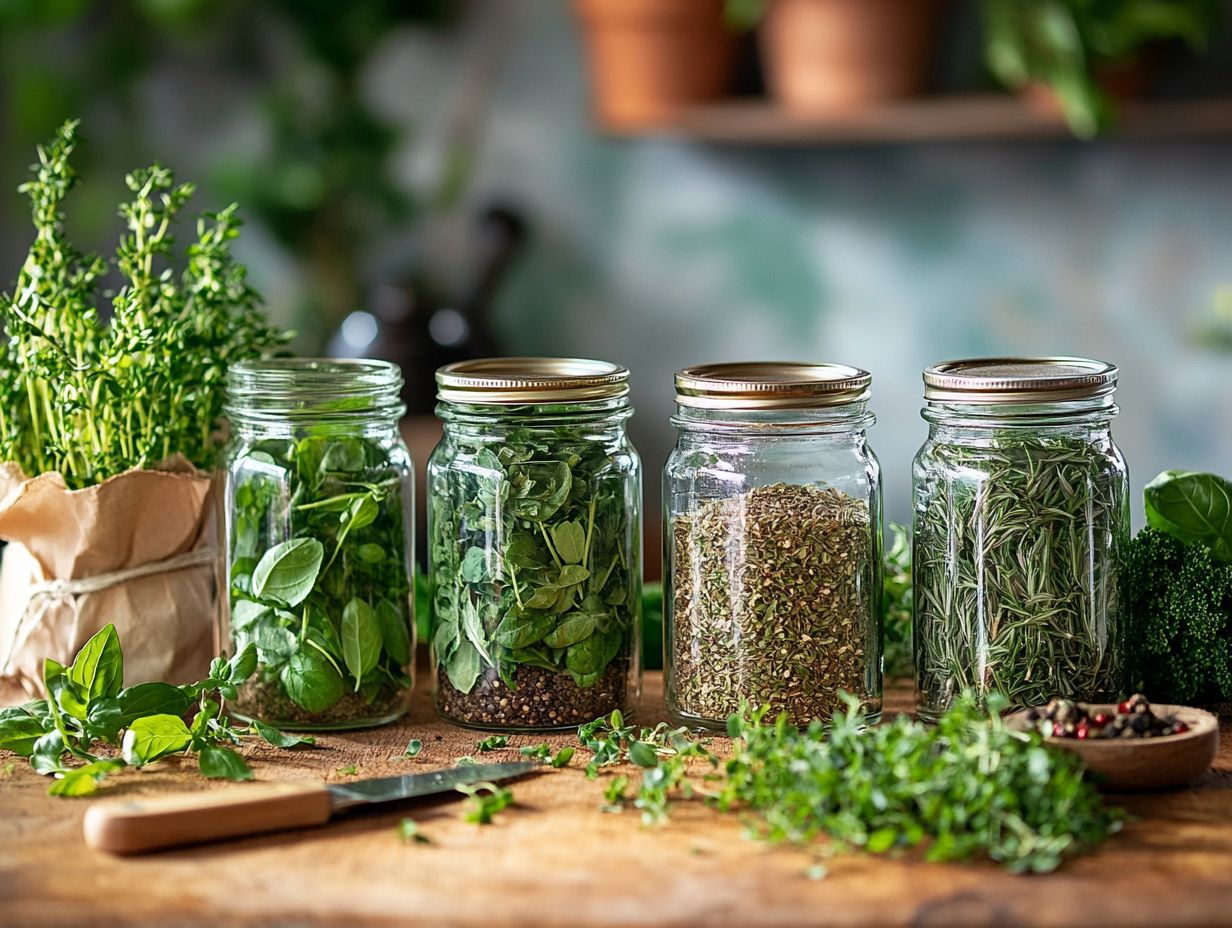
- Garlic is a versatile herb that adds flavor to dishes and has numerous health benefits, such as boosting the immune system and reducing cholesterol levels.
- Ginger is not only great for aiding digestion, but it also has anti-inflammatory properties and can help alleviate nausea and morning sickness.
- Turmeric is a powerful anti-inflammatory herb that can help with conditions such as arthritis and may even have potential cancer-fighting properties.
1. Garlic: The Versatile Herb
Garlic is celebrated as a versatile herb. It offers bold flavor and impressive health benefits. This makes it a must-have ingredient in kitchens worldwide, particularly in Italian cuisine.
This pungent bulb can effortlessly enhance your recipes whether you re roasting it alongside vegetables or mincing it into a zesty pesto.
Research showcases garlic s anti-inflammatory attributes, which may bolster joint health. It also has potential cardiovascular perks, aiding circulation and helping to lower cholesterol levels.
Growing garlic in your herb garden adds a colorful addition and enhances your cooking endeavors.
2. Ginger: The Digestive Aid
Ginger, often hailed as a potent digestive ally, has graced kitchens for centuries. It is revered for its ability to calm the stomach and elevate flavors in recipes.
This remarkable root can enhance a variety of dishes, from zesty stir-fries to comforting teas. It s known to ease nausea and support digestion.
If you re eager to harness the power of ginger, integrating it into your herb garden is easy; it flourishes in warm, humid conditions.
Celebrated across cultures, ginger secures its place as a beloved ingredient around the globe.
3. Turmeric: The Anti-Inflammatory Powerhouse
Turmeric is a vibrant culinary herb that imparts a golden hue to your dishes. It boasts an impressive array of health benefits, making it a must-have ingredient for anyone looking to promote healthy eating.
By incorporating turmeric into your recipes, you unlock a world of culinary possibilities. Its earthy flavor harmonizes beautifully with other herbs like ginger and garlic.
For those with an herb garden, cultivating turmeric can be especially rewarding; it flourishes in warm, humid conditions and requires minimal care.
To maximize turmeric s health benefits, consider pairing it with a pinch of black pepper, which significantly boosts absorption of curcumin, its primary active compound.
Whether you’re crafting a comforting curry or a refreshing herbal tea, this remarkable ingredient is sure to elevate both the flavor and nutritional value of your meals.
Start adding these incredible herbs to your meals today and feel the difference!
4. Cinnamon: The Blood Sugar Regulator
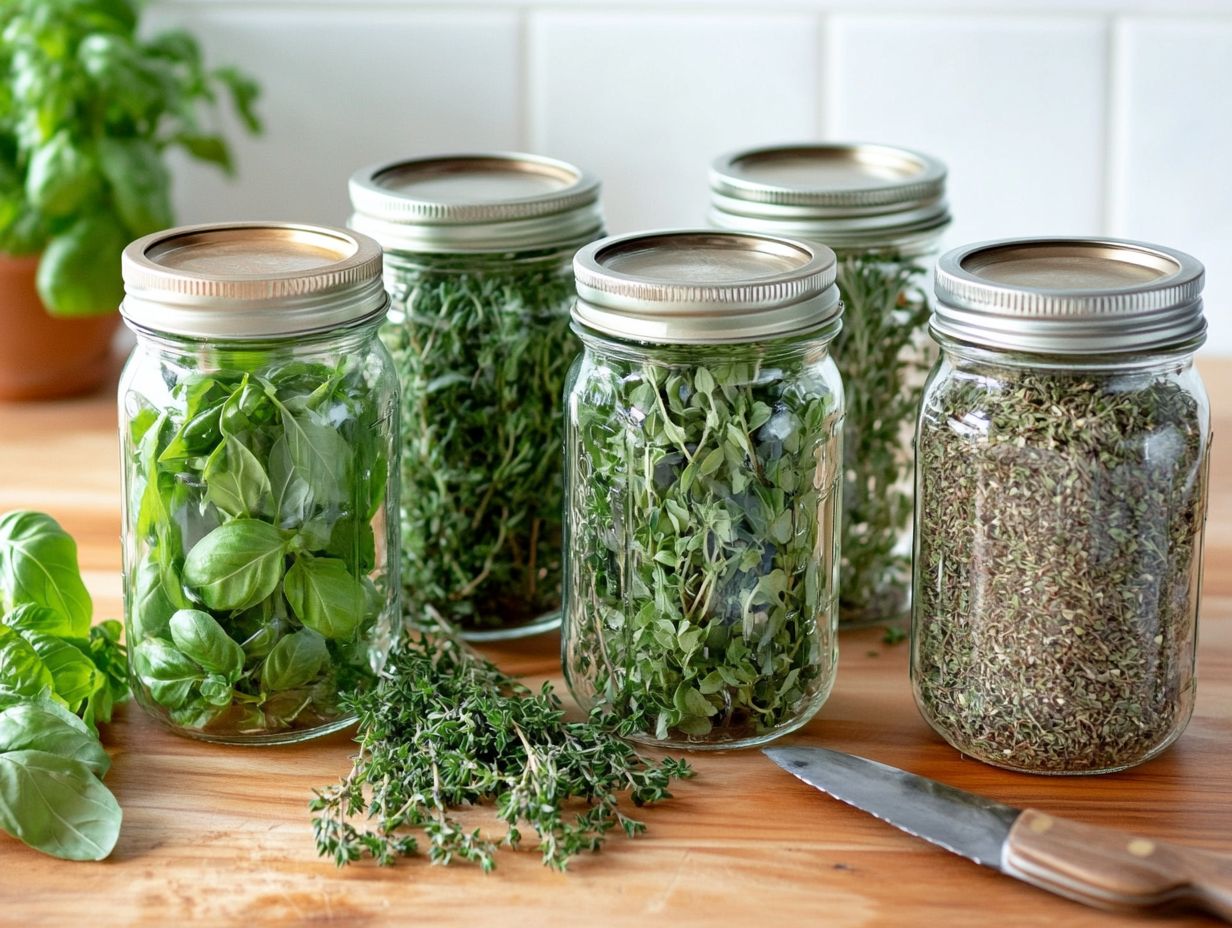
Cinnamon is a cherished culinary herb known for its warm, aromatic flavor. It also helps regulate blood sugar levels, making it a valuable ally in your healthy eating plan and a standout among medicinal herbs.
This versatile spice frequently graces sweet dishes like cinnamon rolls, oatmeal, and desserts, infusing them with its distinct sweetness. It enhances the overall taste experience. In savory recipes, it introduces an unexpected depth to dishes such as stews, curries, and even roasted vegetables, elevating their flavor profiles to new heights.
Beyond its culinary allure, cinnamon boasts impressive health benefits, particularly in blood sugar management. Incorporating this spice into your daily meals is a breeze add a sprinkle to your smoothies, use it in your baking endeavors, or even grow it in your herb garden to enjoy its fresh fragrance and flavor right at home.
5. Basil: The Antioxidant-Rich Herb
Basil is that aromatic culinary gem not just a staple in Italian cuisine; it s overflowing with antioxidants, making it a key player in healthy eating. It deserves a prominent place in your herb garden and can elevate countless herb-forward recipes.
Its culinary versatility is unmatched. It enhances sauces, brightens fresh salads, and serves as a stunning garnish that adds both flavor and visual appeal. Basil also offers health benefits, as it s packed with antioxidants that help reduce the harmful effects of aging and pollution, promoting your overall wellness while providing essential vitamins.
To keep your basil fresh and vibrant, consider storing it in a glass of water like a bouquet or wrapping it in slightly damp paper towels before placing it in a plastic bag. This simple trick can significantly extend its shelf life.
With its lively flavor profile and numerous health benefits, basil truly deserves a special place in your home kitchen.
How Can These Herbs Be Used in Everyday Cooking?
Incorporating herbs into your everyday cooking is a delightful way to elevate flavor, nutrition, and overall health. By embracing fresh herbs like basil, thyme, and rosemary in your recipes, you can transform your dishes while also exploring 5 essential oils derived from herbs, championing the principles of healthy eating.
Fresh herbs not only bring a vibrant burst of flavor but also offer a treasure trove of health benefits, making them essential staples in your kitchen. Take, for example, a simple basil pesto: it can elevate pasta dishes, enhance sandwiches, or even add a unique twist to smoothies. Thyme lends a robust earthiness that beautifully complements roasted vegetables and meats. Meanwhile, rosemary can elevate the humble potato or infuse olive oil for a truly delightful dipping sauce. To learn more about these ingredients, check out 5 common herbs and their benefits.
Experimenting with these herbs can turn your everyday meals into gourmet experiences. This encourages a delicious and nutrient-dense diet that supports your overall vitality.
What Are the Health Benefits of These Herbs?
The health benefits of culinary herbs go far beyond merely enhancing flavor; many of these herbs, such as turmeric, ginger, and garlic, are classified as medicinal. They are celebrated for their wellness-promoting properties, making them essential components of culinary nutrition.
Take turmeric, for example. It’s celebrated for its active compound, curcumin, known for its powerful anti-inflammatory and antioxidant effects that offer protection against chronic diseases. Ginger is famed for its digestive benefits, helping to alleviate nausea and improve overall gastrointestinal health. And let’s not forget garlic, which is lauded for its immune-boosting properties and its ability to support cardiovascular health by reducing cholesterol levels.
By incorporating these herbs into your daily meals, you not only elevate flavors but also enrich your diet with vital nutrients that contribute to a stronger, healthier body.
How Can These Herbs Be Used for Medicinal Purposes?
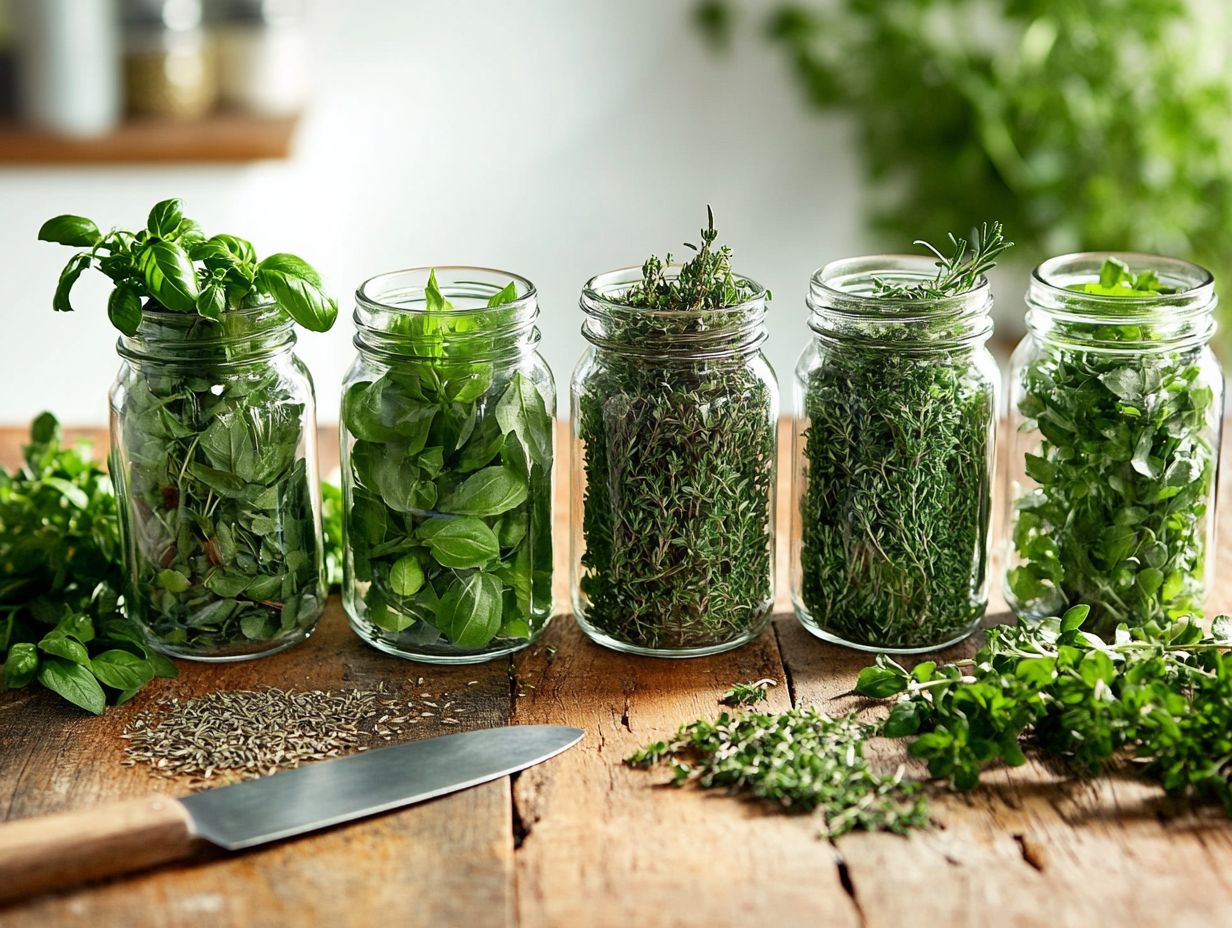
Many cooking herbs, such as ginger and cinnamon, are not just delightful additions to your meals; they also possess remarkable medicinal properties that can enhance your health and well-being. Think of them as valuable allies in your pursuit of a healthier lifestyle.
Discover the magic of ginger! Often found in teas or smoothies, it s renowned for its ability to ease digestive discomfort and reduce inflammation. By incorporating ginger into your daily meals, you can elevate the flavor while reaping significant therapeutic benefits.
Cinnamon also helps control blood sugar levels, making it a superb choice for breakfast oatmeal or baked goods. This spice not only brings warmth to your dishes but also supports your overall health.
Don t overlook other herbs like turmeric and garlic, which also boast impressive health benefits. This reinforces the idea that what delights your palate can simultaneously nourish your body.
Are There Any Side Effects of Using These Herbs?
While cooking herbs offer a wealth of health benefits, it’s essential to remain vigilant about potential side effects, especially when consuming them in concentrated forms or in excess. Some medicinal herbs can pose risks to your health.
For example, comfrey and kava can be harmful if ingested in large quantities. Comfrey contains chemicals that can be harmful in large amounts, potentially leading to liver damage. Kava has also been linked to serious liver issues. Overindulging in licorice can result in high blood pressure or electrolyte imbalances.
It s wise to prioritize moderation and be aware of these risks, particularly if you have pre-existing health conditions or are taking medication. Before adding these herbs to your routine, talk to a healthcare professional to ensure they re right for you.
How Can These Herbs Be Stored and Preserved?
Proper storage and preservation techniques for fresh herbs can significantly extend their shelf life. This way, you can savor the vibrant flavors of cooking herbs like rosemary and thyme in your dishes for much longer.
By grasping the nuances of refrigeration and drying methods, you can ensure that these invaluable ingredients retain their potency and nutritional benefits.
When storing herbs in the refrigerator, it s best to wrap them gently in a damp paper towel before placing them in a loose plastic bag. This clever trick maintains moisture without inviting rot.
On the other hand, drying herbs involves hanging them upside down in a cool, well-ventilated area or using a dehydrator for quicker results. When executed correctly, these methods preserve the herbs’ flavor and their essential vitamins and antioxidants, elevating your overall culinary experience.
What Are Some Other Common Herbs Found in Kitchens?
Beyond the well-loved herbs like basil and rosemary, a treasure trove of common cooking herbs awaits your discovery, including 5 must-have herbs for your garden, each offering unique flavors and nutritional perks that can elevate your dishes.
Take dill, for instance its distinctive taste is perfect for bringing life to pickles and seafood. Then there’s mint, which provides a refreshing twist that can transform your beverages and desserts. Oregano, with its warm and robust flavor, is a staple in Italian cuisine.
These herbs not only enhance your meals but also come with a host of health benefits:
- Dill aids digestion.
- Mint freshens breath.
- Oregano packs antioxidants.
By incorporating these herbs into your garden, you re not just expanding your culinary repertoire; you’re also taking a step towards a healthier lifestyle.
Frequently Asked Questions
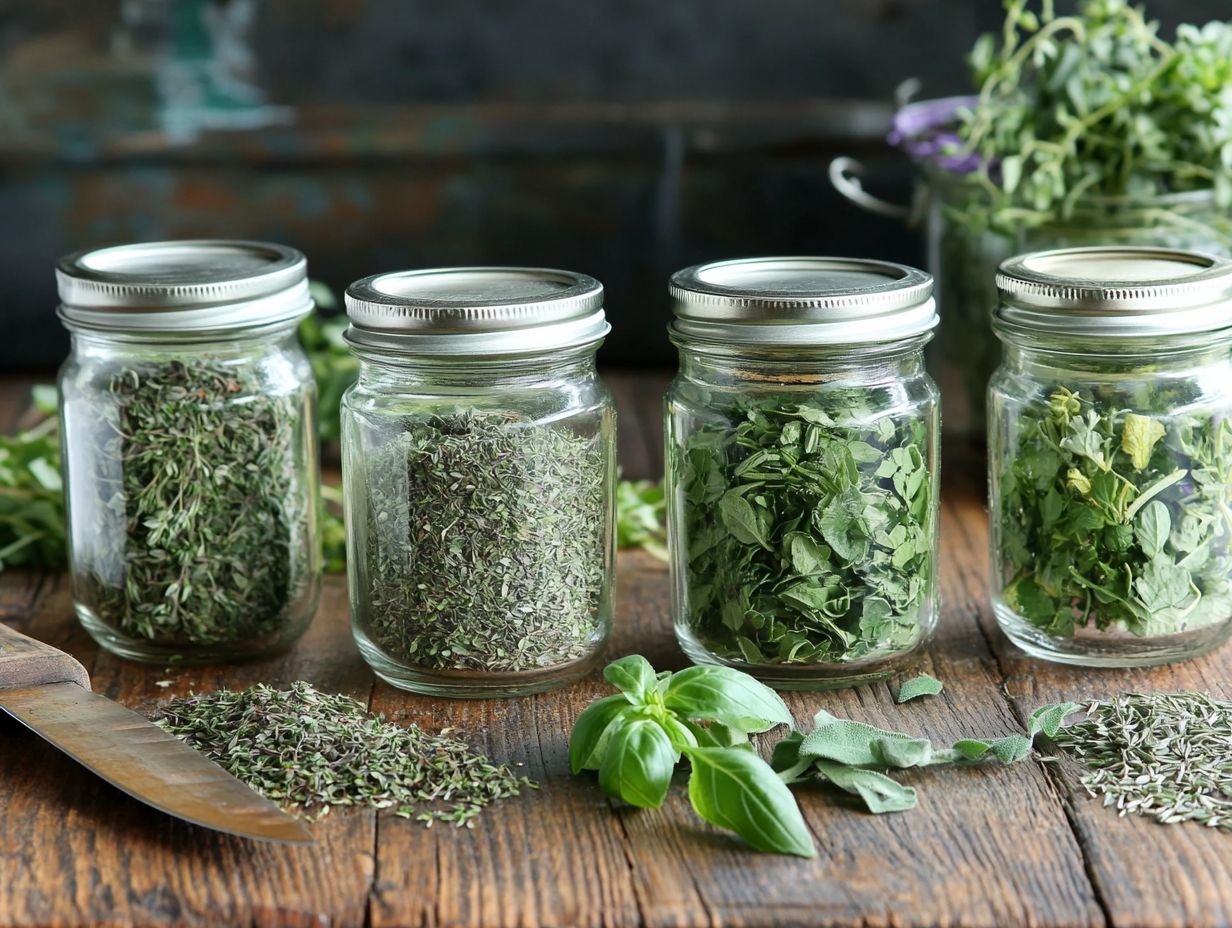
What are the 5 common herbs found in every kitchen?
The 5 common herbs found in every kitchen are basil, rosemary, thyme, parsley, and oregano.
Why are these herbs commonly found in kitchens?
Want to spice up your cooking? These herbs, known for their culinary and medicinal uses, add flavor and aroma to your dishes. They’re easy to grow in small indoor gardens, making them a great addition to your kitchen. Check out this list of 5 herbs known for their culinary and medicinal uses.
What are the health benefits of these herbs?
Basil helps reduce inflammation and is rich in antioxidants.
Rosemary boosts memory and concentration.
Thyme is known for its antibacterial and antifungal properties.
Parsley is a great source of vitamin C, while oregano has antimicrobial benefits.
How can I use these herbs in cooking?
Basil and parsley are perfect additions to salads and pasta.
Rosemary and thyme enhance the flavor of meats, making them ideal for marinades.
Oregano is a must-have for Italian dishes like pizza and pasta sauces. Don’t wait! Add these flavorful herbs today to elevate your meals!
Can I use dried versions of these herbs?
Yes, dried herbs work, but fresh ones pack more flavor and health benefits.
When using dried herbs, remember to use less since they are more concentrated.
Are there any precautions when using these herbs?
Some people may be allergic or sensitive to certain herbs. Always try a small amount first.
Pregnant women should consult their doctor before using large amounts of some herbs.

